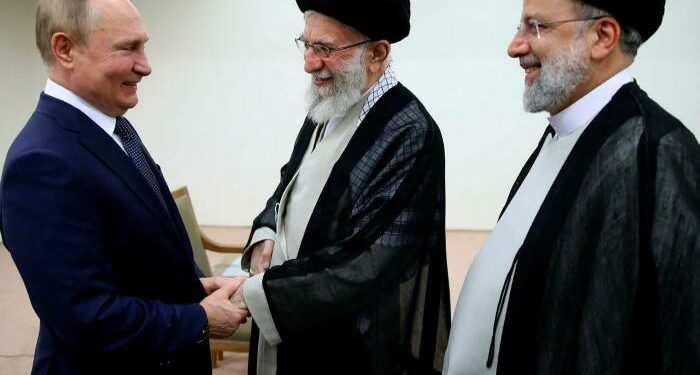Russian president Vladimir Putin arrived in Tehran on Tuesday for a summit with his Iranian and Turkish counterparts that will have crucial implications for his military campaign in Ukraine.
Putin’s trip, his second foreign visit since he launched a full invasion of Ukraine in late February, is ostensibly for three-party talks with Iran’s Ebrahim Raisi and Turkey’s Recep Tayyip Erdoğan on the Syrian conflict.
But the meeting could produce a breakthrough in talks to end Russia’s blockade of Ukraine’s Black Sea ports, which Erdoğan and the UN are mediating to secure the passage of millions of tonnes of grain.
Ukraine, the EU and Turkey have said the grain talks are close to securing a deal possibly as soon as this week. Before the invasion, Ukraine was the world’s fifth-largest wheat exporter and a big supplier for countries including Syria, Libya and Lebanon.
But any deal will require Putin’s personal sign-off, according to western officials, as Russia is demanding the west roll back sanctions it says are limiting its own grain exports.
“Beyond any doubt, it is 100 per cent sure that this issue will be discussed directly by the presidents,” Yuri Ushakov, Putin’s foreign policy adviser, told reporters on Monday, according to news agency Interfax.
Western officials are worried Iran may intervene in the Ukraine conflict after the US warned that Iran was preparing to supply Russia with hundreds of drones and other unmanned aerial vehicles last week.
High on the agenda of the three-way meeting will be Erdoğan’s vow to launch a new incursion into Syria targeting Kurdish militants in the country’s north-west. Russia, Iran and Turkey all have a stake in the 11-year conflict.
Moscow and Tehran are the two most important foreign backers of President Bashar al-Assad, while Ankara has long supported rebel groups seeking to topple him.
Although they back opposing sides, the three countries have worked together to shape the future of the war-torn country, sidestepping UN-led negotiations aimed at ending the civil war.
Erdoğan, whose military controls several pockets of northern Syria after launching four previous incursions over the past six years, announced at the end of May that he was planning a fresh offensive to drive Kurdish militants out of two north-western areas.
Speaking after a bilateral meeting with Putin, the Turkish president suggested he had failed to win approval from Putin for the operation, which would target an area of Syria that is part of Russia’s sphere of influence.
“I hear words from you, dear friends, that Turkey’s security concerns are understood,” Erdoğan said at the start of the summit. “I am grateful for this, but words alone are not enough.” He urged both Moscow and Tehran to offer “their sincere support for this clean-up in Syria”.
Erdoğan has positioned Turkey as a mediator in the Ukraine conflict. Turkey has said Russia’s invasion is “unacceptable” and supplied Ukraine’s armed forces with its Bayraktar TB2 drones. But it has simultaneously declined to sign up to western sanctions against Moscow and carved out a role as one of the prime destinations for Russians unable to access financial services in the west.
Ushakov said Russia and Turkey would discuss a transition to alternative payment mechanisms, a priority for Moscow after western sanctions effectively froze it out of using the dollar.
The unprecedented sanctions against Russia have prompted Moscow to increase co-operation with Tehran. Iran has spent more than a decade under similarly bruising sanctions over its nuclear programme and support for Islamist militant groups, and Moscow is keen to learn how it has dealt with the restrictions.
Dmitry Peskov, Putin’s spokesman, told Iranian state media on Sunday that sanctions were “the price our country and Iran are paying for our sovereignty”, according to state newswire RIA Novosti.
Regime insiders in Tehran acknowledge the importance of maintaining good relations with Moscow to foster co-operation in Syria and as a means to increase trade in the face of international sanctions.
National Iranian Oil Company on Tuesday announced a memorandum of understanding with Russia’s Gazprom to help develop Iran’s oil and gasfields in an agreement that could be worth $40bn.
Russia supported a restoration of the 2015 agreement on Iran’s nuclear programme, which collapsed when former US president Donald Trump withdrew from it in 2018, and wanted to roll back the sanctions against Tehran, Ushakov said.
Additional reporting by Najmeh Bozorgmehr in Tehran











